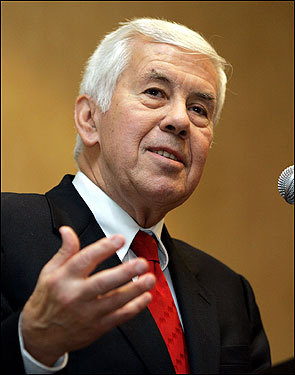
Former Indiana senator Richard Lugar presented the George Herbert Walker Jr. Lecture in International Studies at Yale on January 14. Sponsored by the MacMillan Center, his lecture was titled “Modern American Foreign Policy in an Uncertain World.”
Lugar is president of the Lugar Center, a nonprofit organization focusing on nuclear nonproliferation, food security, and other critical issues. A fifth-generation Hoosier who was the longest-serving member of Congress in Indiana history, Lugar is recognized as a gifted local and state leader, as well as a respected national and international statesman. He was the fourth person ever named Outstanding Legislator by the American Political Science Association.
After lamenting the current state of Congressional affairs, Lugar presented an honest look at the place of the United States on the world stage today.
“On one side of the balance sheet,” Lugar remarked, “there resides firmly the United States military – the largest to have ever inhabited this planet.” But the strength of the U.S. military extends far beyond simply wars and battles. “The United States is the only country in the world that can control the high seas and can keep the sea lanes open for foreign trade.”
Beyond physical credibility, the United States also possesses the ability to “produce food to feed not only America but also millions of people abroad as well, and so too it is on the threshold of becoming the largest natural gas and oil producer as well.”
However, all is not rose-tinted when peering through the glasses of U.S. foreign policy, and the other side of the balance sheet is heavily stacked.
“We are still embroiled in Afghanistan,” Lugar noted. “It’s made even further complicated by the fact that Afghanis don’t want us to leave when we have been promoting democracy, women’s rights and human rights, but 75%-85% of our people want us out.”
“The effects of our decision to enter Iraq can still be felt to this day,” Lugar despaired. “The 2003 invasion began a streak where leaders topple easily, which still resonates to this day with the Arab Spring.”
If Afghanistan and Iraq were not enough, there are still vital challenges with Syria, with Iranian and North Korean nuclear programs, and difficulties ranging from cyber warfare to climate change.
Above all else, the greatest challenge to modern American foreign policy in an uncertain world is the threat of the “floating menace.” Lugar noted, “Clashes with nation states are rapidly falling by the wayside whereas nonstate actors continue to wreak havoc.” How the United States will choose to respond to these threats will ultimately determine the nation’s foreign policy success of the early twenty-first century.
American foreign policy may not have sunk as low as Congress’ nine-percent approval rating, but challenges abound. Lugar affirmed that there is a dearth of true American leadership today, and beyond cyberterrorism or threats from nonstate actors, the leadership drought may ultimately define America’s foreign policy. “In the words of David Brooks,” Lugar concludes, “we are in desperate need of a leadership revival.”
